The Wrong Amount of Water to Drink Every Day, Says Exercise Scientist
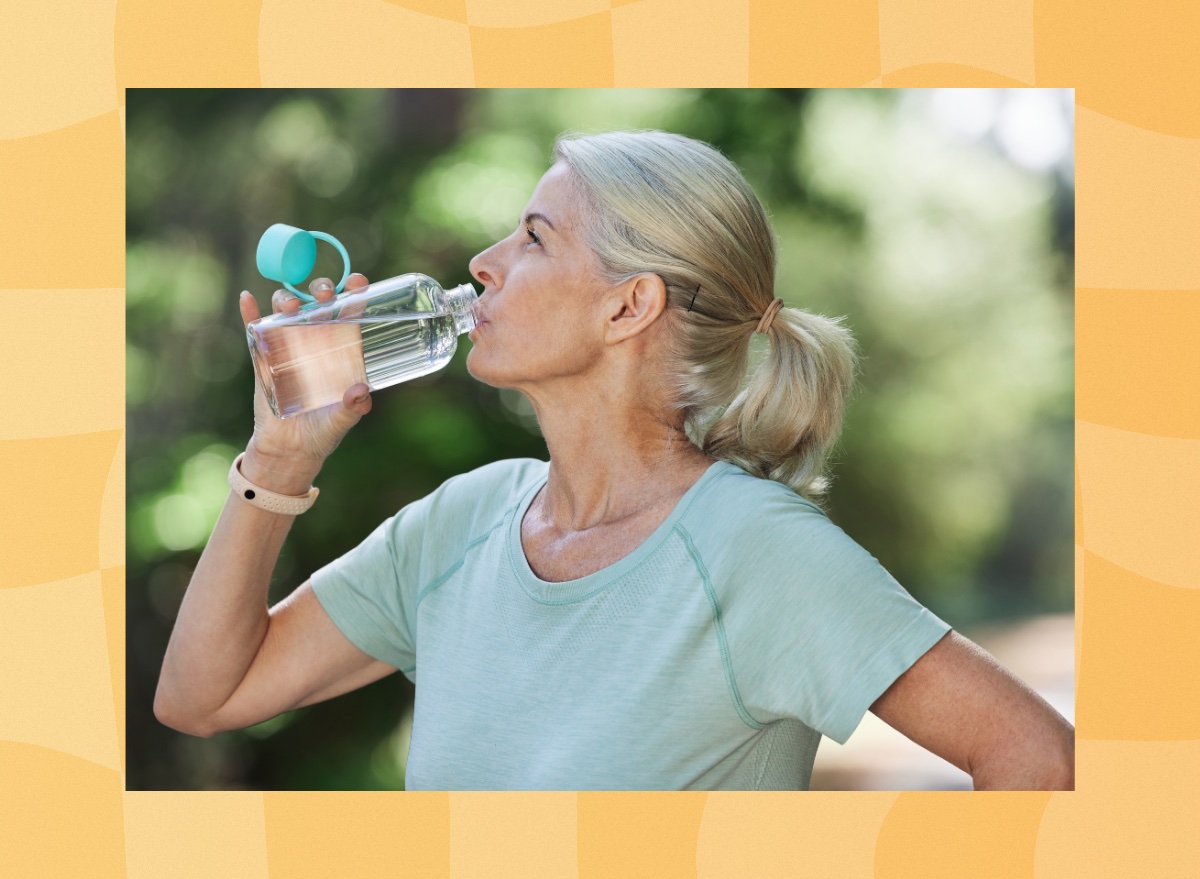
Your body is 60% water, health and fitness experts will tell you, and replenishing your body with its most vital necessity is one of the cornerstones of a healthy and active life. According to the Journal of Biological Chemistry, your brain and heart are 73% water, your lungs are 83% water, your muscles are 79% water, your skin is 64% water, and even your bones are composed of 31% water. After all, this is why consuming enough H20 provides energy, optimizes your metabolism, brightens your skin, and helps your body flush out toxins and focus your brain.
That being said, you can still be consuming water incorrectly, whether it's drinking too little, drinking at the wrong times of the day, or drinking too much. Social media is filled with "hydration challenges" that require people to drink a lot of water—and scientists will tell you that overdoing it bad, as well. Recently, Tamara Hew-Butler, DPM, Ph.D., an associate professor of exercise and sports science at Wayne State University, sounded the alarm on bad hydration habits. Here are some of the no-nos according to her, as well as some other notable experts. And for more advice for living a healthier, more active life, see here for The One Abs Exercise That Science Says Is the Absolute Best.
Is Eight Glasses of Water a Day the Right Amount?
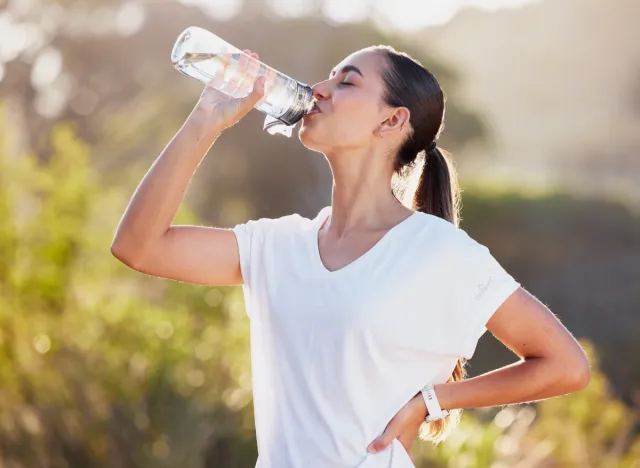
According to Hew-Butler, the common recommendation of 8 glasses of 8 ounces of water per day isn't necessarily correct, and its origins are murky. "It remains unclear where the "8 x 8" water intake recommendation comes from," she writes in an article for The Conversation. "Perhaps, this two-liter intake threshold is derived from a misinterpretation of original recommendations offered by the U.S. Food and Nutrition Board in 1945 as well as the 2017 European Food Safety Authority, which states the daily recommended amount of water includes all beverages plus the moisture contained in foods."
On the latter point, she notes that many of us don't necessarily account for the water we get from food. We get water every day from our foods—especially fruit—as well as soups, milk, and even soda and alcohol. So the "8 x 8" guideline isn't perfect, and it may not be exact amount of water you should aspire to drink every day. And for more great healthy living advice, don't miss the Secret Exercise Tricks for Keeping Your Weight Down for Good.
You Need Enough Water, But Not Too Much
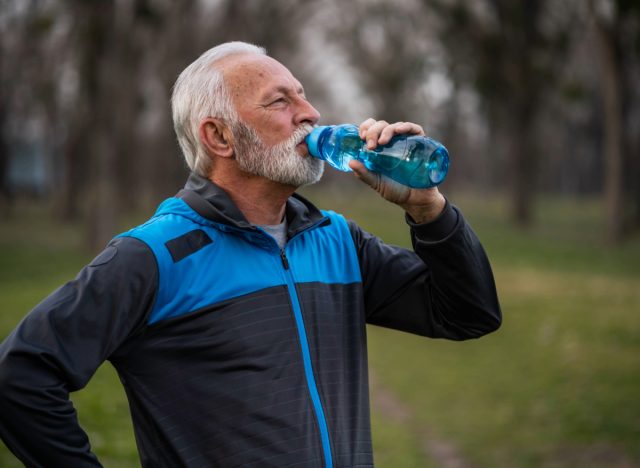
If you're active on social media and you've got some fit and motivated friends, you've probably seen the Gallon Water Challenge in action. It's exactly what it sounds like: You're required to drink a gallon of water every day. A gallon is 160 ounces a day, which is a lot—it's nearly 100 ounces more than the aforementioned "8 x 8" recommendation. People who have done it will tell you that it's incredibly difficult, and they have to space out their drinking over the course of the entire day. They also find that they use the bathroom a lot—as in, like, every 20 minutes.
Is this necessary? The short answer is no. "Everybody's hydration levels are different, but most people don't need a daily gallon," advises Dietitian Beth Czerwony, MS, RD, CSOWM, LD, of the Cleveland Clinic.
As Hew-Butler explains, there's a point where all of that extra water simply does you no good, and it has everything to do with your kidneys. "You've heard from a lot of people that you need to drink more, more, more," she writes, but notes that this simply isn't the case.
Your kidneys make molecular adjustments all the time depending on your hydration levels, and when you overconsume water, your body simply adjusts to get rid of it. "This is why when we drink more water than our body needs—above thirst—we immediately have to [use the bathroom to rid ourselves of] any excess water. Or when we forget our water bottle during practice, we stop [using the bathroom] to conserve body water. This quick coordinated action between the brain, cranial nerves and kidneys is far more efficient and precise than any phone app, gadget or personalized recommendation available."
You Can Cause Body Damage by Drinking Too Much
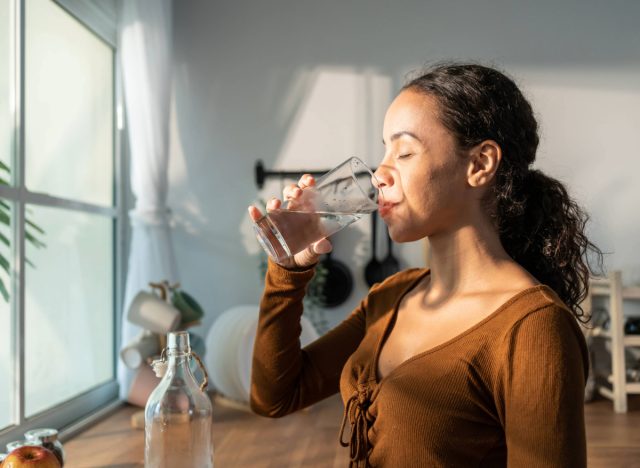
Overdrinking water, like undertaking the gallon challenge, is uncomfortable for us to do because our bodies are telling us not to do it. "Our brain tries to discourage chronic overdrinking, or polydipsia, because "social polydipsia" causes chronic [urination] (polyuria), which can lead to internal plumbing modifications such as bladder distention, ureter dilation, hydronephrosis, and renal failure," notes Hew-Butler.
The Cleveland Clinic's Czerwony notes that drinking way too much water can actually become dangerous and even life-threatening. "Hyponatremia is when the sodium levels in your body drop too low because of too much water," she Czerwony explained to the Cleveland Clinic. "Other conditions can trigger hyponatremia, but it can also be caused by consuming too much water in a very short amount of time. All of the water dilutes your sodium levels and your blood can become 'watered down'."
Drink to Thirst
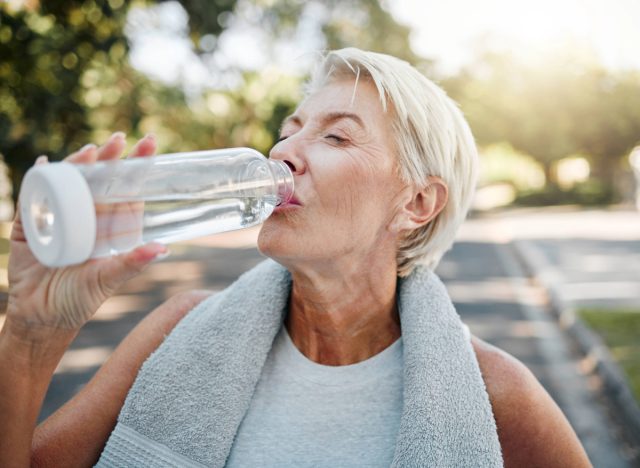
Hew-Butler's overall point is clear: Your body has a million years of evolution at play here when it comes to consuming water, and it's smarter at providing hydration instructions than any guideline or social-media challenge. Yes, drink plenty of water, but you should drink to thirst. If you're exercising, you'll obviously want to replenish your water stores, but, when in doubt, the best indication for whether or not you need more water is likely in your toilet bowl.
"A good rule of thumb is to take a peek at the color of your [urine]," says the Cleveland Clinic. "If you're hydrated, it should be a light lemonade color, but it doesn't necessarily need to be clear. If [it's] darker, that might be an indicator to up your water intake, but keep in mind that some medications (and even food) can affect the color too."
And remember: If you drink too much water before bed, you're setting yourself up for a poor night of sleep. For more on this, see Why You Should Never Drink Water Before Bed.








